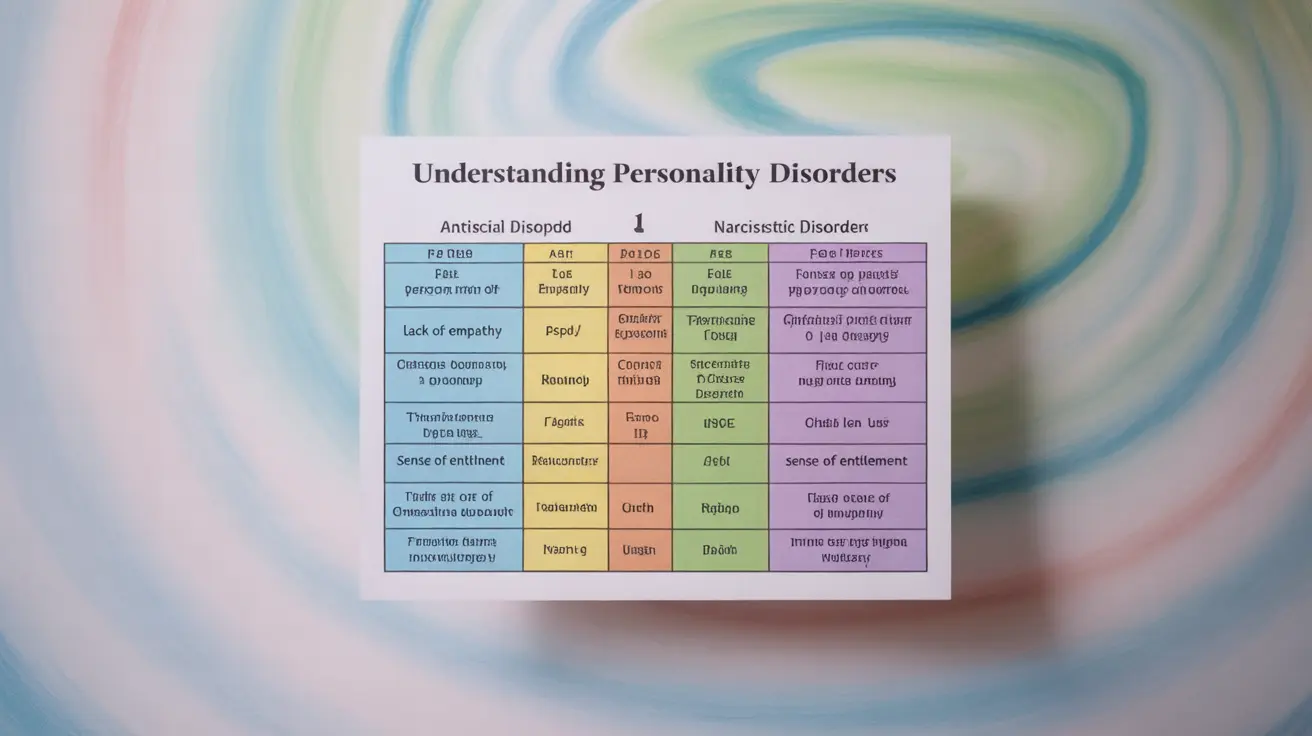Antisocial personality disorder (ASPD) and narcissistic personality disorder (NPD) are complex mental health conditions that can significantly impact individuals and their relationships. While these disorders may share some surface-level similarities, they have distinct characteristics, motivations, and treatment approaches that set them apart. Understanding these differences is crucial for proper diagnosis, treatment, and managing relationships with affected individuals.
Key Characteristics and Core Traits
The fundamental differences between ASPD and NPD lie in their core characteristics and how they manifest in behavior and relationships.
ASPD Primary Traits
People with antisocial personality disorder typically display:
- Persistent disregard for others' rights
- Lack of remorse or empathy
- Impulsive and risky behavior
- History of legal problems or violating social norms
- Manipulation for personal gain
- Difficulty maintaining long-term relationships
NPD Primary Traits
Those with narcissistic personality disorder commonly exhibit:
- Grandiose sense of self-importance
- Need for admiration and attention
- Sense of entitlement
- Preoccupation with fantasies of success and power
- Exploitation of relationships for self-advancement
- Difficulty accepting criticism or failure
Motivational Differences
Understanding what drives individuals with these disorders helps distinguish between them more clearly.
ASPD Motivations
People with ASPD are primarily motivated by:
- Immediate gratification
- Personal gain regardless of consequences
- Thrill-seeking behavior
- Control over others through fear or manipulation
- Avoidance of responsibility or accountability
NPD Motivations
Individuals with NPD are typically driven by:
- Need for validation and admiration
- Maintaining an image of perfection
- Achievement and recognition
- Protection of their self-image
- Desire to be seen as special or unique
Impact on Relationships
Both disorders significantly affect interpersonal relationships, but in distinct ways:
ASPD Relationship Patterns
People with ASPD tend to:
- Form shallow connections
- Show little genuine emotional attachment
- Manipulate others for practical benefits
- Display inconsistent or unreliable behavior
- Have difficulty maintaining long-term relationships
NPD Relationship Patterns
Those with NPD typically:
- Form relationships based on admiration
- Require constant validation
- Show difficulty with emotional intimacy
- React strongly to perceived criticism
- Maintain relationships that serve their self-image
Treatment Approaches and Prognosis
While both conditions present challenges for treatment, different approaches may be more effective for each disorder:
ASPD Treatment
Treatment for ASPD often focuses on:
- Cognitive behavioral therapy
- Anger management
- Impulse control strategies
- Substance abuse treatment (if present)
- Legal compliance programs
NPD Treatment
NPD treatment typically emphasizes:
- Psychodynamic therapy
- Emotional regulation skills
- Empathy development
- Self-reflection exercises
- Interpersonal effectiveness training
Frequently Asked Questions
What are the main differences between antisocial personality disorder (ASPD) and narcissistic personality disorder (NPD)?
The main differences lie in their core motivations and behaviors. ASPD is characterized by a pattern of disregard for others' rights and lack of empathy, while NPD is marked by an excessive need for admiration and a grandiose sense of self-importance. People with ASPD typically seek immediate gratification and control, while those with NPD are driven by maintaining their self-image and receiving validation.
How can I recognize the symptoms of sociopathy (ASPD) compared to narcissism (NPD)?
ASPD symptoms include persistent rule-breaking, deceitfulness, impulsivity, and lack of remorse. NPD symptoms involve grandiose self-image, need for constant admiration, sense of entitlement, and preoccupation with fantasies of unlimited success or power. ASPD behaviors tend to be more openly antisocial, while NPD behaviors center around maintaining a superior self-image.
What motivates people with ASPD versus those with NPD in their behaviors and relationships?
People with ASPD are typically motivated by immediate personal gain, thrill-seeking, and control over others, often disregarding consequences. Those with NPD are motivated by maintaining their self-image, receiving admiration, and achieving recognition, with a strong focus on protecting their perceived superiority.
Can antisocial personality disorder and narcissistic personality disorder be treated, and what are the common treatment options?
Both disorders can be treated, though they present unique challenges. ASPD treatment focuses on behavioral management, impulse control, and addressing specific problematic behaviors. NPD treatment emphasizes psychotherapy to develop emotional awareness, empathy, and healthier relationship patterns. Both conditions typically require long-term therapeutic intervention.
How do ASPD and NPD affect interpersonal relationships and social functioning differently?
ASPD impacts relationships through manipulation, lack of emotional attachment, and disregard for others' wellbeing. NPD affects relationships through excessive need for admiration, difficulty with emotional intimacy, and exploitation of others for self-enhancement. While both can damage relationships, ASPD tends to result in more overtly destructive behaviors, while NPD creates patterns of emotional manipulation and dependency.




